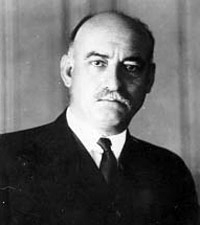Vojislav Marinković
Serbian and Yugoslav diplomat and politician From Wikipedia, the free encyclopedia
Serbian and Yugoslav diplomat and politician From Wikipedia, the free encyclopedia
Vojislav Marinković (Serbian Cyrillic: Војислав Маринковић; 13 May 1876[1] – 18 September 1935)[2] was a Serbian and Yugoslav diplomat and politician, serving two times as Minister of Foreign Affairs and briefly as Prime Minister of the Kingdom of Yugoslavia.
Vojislav Marinković | |
|---|---|
 | |
| 9th prime minister of Yugoslavia | |
| In office 4 April 1932 – 3 July 1932 | |
| Monarch | Alexander I |
| Preceded by | Petar Živković |
| Succeeded by | Milan Srškić |
| Minister of Foreign Affairs | |
| In office 17 April 1927 – 3 July 1932 | |
| Preceded by | Ninko Perić |
| Succeeded by | Bogoljub Jevtić |
| In office 27 July 1924 – 6 November 1924 | |
| Preceded by | Momčilo Ninčić |
| Succeeded by | Momčilo Ninčić |
| Minister of the Interior | |
| In office 24 December 1921 – 24 June 1924 | |
| Preceded by | Svetozar Pribićević |
| Succeeded by | Milorad Vujičić |
| Minister of Economy | |
| In office 1914–1917 | |
| Personal details | |
| Born | 13 May 1876 Belgrade, Serbia |
| Died | 18 September 1935 (aged 59) Belgrade, Yugoslavia |
| Political party | Democratic Party Yugoslav National Party |
| Spouse | Ana Lozanić |
| Parent(s) | Dimitrije Marinković Velika Klajn |
| Alma mater | University of Belgrade |
| Profession | Economist |
Marinković was born in Belgrade, then capital of the Principality of Serbia, in 1876. His parents were Dimitrije Marinković, lawyer and politician, and Velika (nee Klajn[3]). He attended secondary school in the city, graduated at the University of Belgrade Faculty of Law and later received doctorate in political science and economics in Paris.[1]
From 1901, he worked in the Ministry of Finance and was director of the Business Bank.[1] He was deputy of the Serbian Parliament from 1906.[1] From 1914 to 1917, he served as Minister of Economy.[1] Again minister at the end of 1918, he participated in the Paris Peace Conference, 1919.[1]
He served as Minister of the Interior briefly at the end of 1921 and beginning of 1922.[1]
He served as Minister of Foreign Affairs in the governments of Ljubomir Davidović (for a few months of 1924), Velimir Vukićević and Anton Korošec, last in the parliamentary term.[4][1]
With the proclamation of the 6 January Dictatorship in 1929, Marinković entered the cabinet chaired by the former commander of the Royal Guard, General Petar Živković.[4] He replaced Živković as prime minister in April 1932, with the aim of changing the image of the dictatorship thanks to his experience as a veteran deputy and distinguished member of the Democratic Party.[4]
During his short tenure as the head of the government, he softened political repression, allowing contacts between the old parties.[4] His program, which was left unimplemented by his early dismissal, included the liberalization of the electoral law passed in 1931 and the revision of the 1931 Constitution, approved during the dictatorship.[5] He publicly mentioned the possibility of calling a referendum on the federalization of the country, which upset both some of his ministers and the King, who relieved him in July 1932.[5] He was succeeded as prime minister by his former Minister of the Interior, Milan Srškić, opposed to the rapid liberalization advocated by Marinković.[5]
He was married to Ana (1881–1973), painter and daughter of chemist Sima Lozanić. They had no children.[6]
Seamless Wikipedia browsing. On steroids.
Every time you click a link to Wikipedia, Wiktionary or Wikiquote in your browser's search results, it will show the modern Wikiwand interface.
Wikiwand extension is a five stars, simple, with minimum permission required to keep your browsing private, safe and transparent.